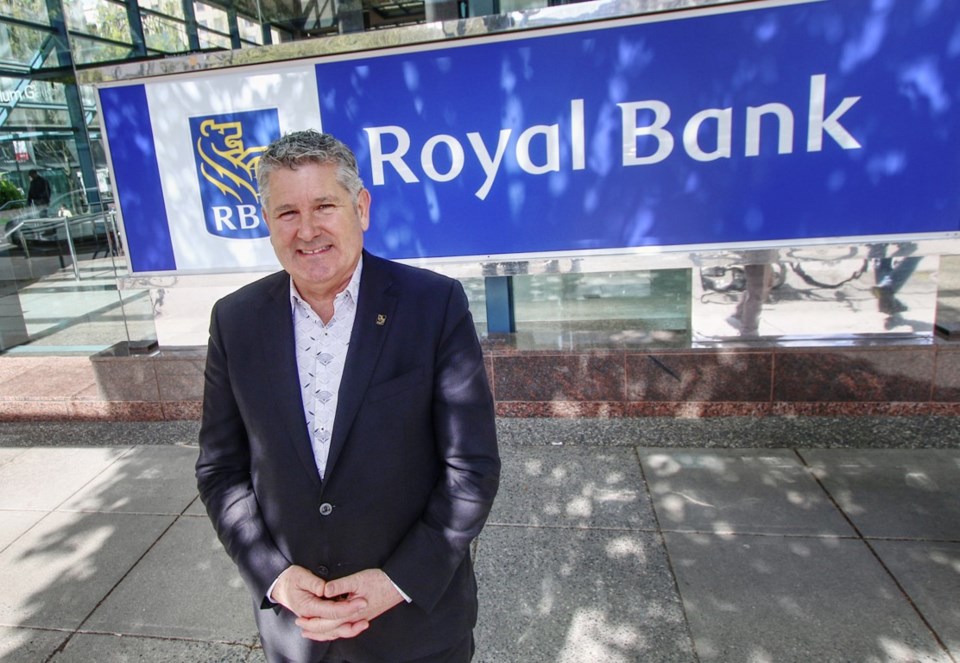Passersby outside the iconic HSBC Bank Canada pendulum building at 885 West Georgia Street on Good Friday were able to witness workers in a crane covering HSBC branding atop the structure.
It was part of one of the biggest banking takeovers in Canadian history.
Following Royal Bank of Canada’s (RBC) (TSX:RY) $13.5 billion deal to buy Vancouver-based HSBC Bank Canada from London-based HSBC Holdings plc (LON:HSBA), which closed at the end of March, an ambitious effort was underway to rebrand HSBC branches with RBC signage, or at least to cover HSBC branding, and swap HSBC’s automatic teller machines (ATMs) with RBC ones.
RBC technicians put just as much – if not more – work into ensuring that customer accounts transitioned seamlessly.
“It has been a tremendous success in terms of execution,” RBC’s regional president for B.C., Martin Thibodeau, told BIV.
“As we reopened during the weekend, all the systems: the savings systems and the investments and the borrowings and the RSPs – all the different products and services, when we reopened the switches, the data were transferred.”
RBC technicians had a maximum 16 months to prepare, from when the deal was agreed to in late November 2022 to the day Canada's largest domestic bank acquisition in history closed.
The only bigger transaction involving a Canadian bank would be Bank of Montreal's (BMO) (TSX:BMO) US$16.3 billion takeover of San Francisco's Bank of the West in 2023.
Quick rebrandings and changed ATMs are standard fare when banks combine operations, say banking analysts, and former board members, such as Carole Taylor, who is a former board member at HSBC Bank Canada as well as its parent HSBC Holdings plc, and at Toronto-Dominion Bank (TD) (TSX:TD).
“When I was on TD bank’s board, we had bought a big bank in New Jersey, and the plan there was that over a weekend, or overnight, all of the banks would be branded TD," she said, referring to the bank's US$8.5 billion transaction in 2008 to buy Commerce Bancorp.
“It was obviously an amazing task [for RBC] to do it over a weekend, and they seem to have done it without a hitch, which was incredible.”

The former HSBC building at 885 West Georgia Street has RBC branding at ground level and is awaiting new RBC branding atop the structure | Rob Kruyt
Acquisition increases RBC’s B.C. presence
One commitment that helped secure federal approval for the transaction was Toronto-based RBC's promise to create a banking hub in Vancouver.
"That was to score political points," Mike Rizvanovic, managing Director, at KBW and an analyst who covers the Canadian banking sector, told BIV.
HSBC Bank Canada had been based in Vancouver so there was political pressure to provide something for B.C., he explained.
The Conservative Party of Canada and its leader, Pierre Poilievre, had urged the government to reject the deal, so Finance Minister Chrystia Freeland had leeway to put strict conditions on how the deal could proceed.
The rebranding effort and the behind-the-scenes technology work are only part of RBC’s plan to create a bigger hub in B.C.
That hub has two components.
First, big picture, RBC has simply grown its operations in B.C. to be a larger part of its own operations because HSBC Bank Canada's operations were disproportionally in B.C.
More than one-third, or 44 of HSBC’s 128 Canadian branches, and approximately 1,000 of HSBC’s 4,600 employees were based in B.C.
This means that RBC’s B.C. operations jumped to more than 8,500 workers in April from approximately 7,542 workers in March.
RBC committed to keep open 33 of HSBC’s branches across Canada – a figure that included 10 branches in B.C., Thibodeau said.
On the transition weekend, RBC permanently closed 15 HSBC branches in B.C., while 19 B.C.-based HSBC branches are set to permanently close in the next year or so, he added.
RBC before the transaction had 170 branches in B.C., Thibodeau said.
That means that that the bank now operates 199 branches in B.C., and it has a plan to whittle that down to 180 branches within the year.
HSBC branches that are near RBC branches are most at risk of closing.
No former HSBC staff have yet been let go, Thibodeau stressed.
He said RBC committed to keep all customer-facing staff at branches employed. As a result, workers at closed HSBC branches have moved to other locations.
About 400 of the HSBC Bank Canada’s 4,600 former employees worked at its head office, and are not considered bank-branch employees, Thibodeau said.
Those workers will be offered positions at RBC, although some of those jobs may be in Toronto, he added.
It is possible, he said, that if employees are not willing to move, the bank will offer them termination packages.
Vancouver banking hub set to power RBC infrastructure
What RBC really committed to when it agreed to create a banking hub in Vancouver is something completely different than simply having a larger general RBC workforce.
It committed to create a 1,000-worker banking division in Vancouver within five years.
RBC workers from various cities across North America are set to relocate to Vancouver and be joined by a net total of 440 new workers to create this stand-alone hub.
“Hopefully we will do this sooner than five years,” Thibodeau said.
He said customers will not interact with workers in the banking hub. Instead, the hub’s workers will create software as well as security systems to prevent cyberattacks, and other core parts of RBC’s internal bank infrastructure.
“As you build more stuff, you need larger pipes,” he said of the need for the future banking hub's improved infrastructure.
“It's like a highway: you need to improve the highway and have more lanes.”
The increasing staff presence would get RBC to more than 9,500 employees when the hub is fully activated, and Thibodeau said he is looking ahead to a staff count near the round number of 10,000.
That growth means RBC has no plans to shed any of HSBC’s former real estate, Thibodeau said.

The former HSBC Bank Canada headquarters on West Georgia Street now has RBC branding | Glen Korstrom
Helping finance affordable housing is part of the deal
Another of Freeland’s conditions, when she approved RBC’s takeover of HSBC Bank Canada, was that the bank provide $7 billion in financing for affordable-housing construction across Canada, or enough capital for developers to build 25,000 new homes.
RBC plans to allot about $2 billion of that capital to be lent to developers in B.C.
Thibodeau said that by spending $13.5 billion to buy HSBC Bank Canada, the bank acquired an extra $200 billion worth of capital, in that bank’s assets, which it is now able to lend.
“We are working in collaboration with the province, and of course, our developers,” he said. “In the past, we might have been limited with the dollars that we had just for real estate. Now we have [more capital.]”
He added that governments do not start projects on their own, and that developers are a vital piece of the puzzle.
“You need a government that makes it easy, and a city that allows the market to build,” he said.
Some service changes impact customers
Before RBC acquired HSBC Bank Canada, HSBC’s customers were able to use that bank’s own ATM machines free of charge as well as all ATMs owned by any of B.C.’s 36 credit unions, without a fee for simple withdrawals.
Thibodeau estimated that RBC has about 600 ATMs in B.C. because many of its ATMs are stand-alone kiosks outside bank branches.
That, he said, is a much larger network of fee-free ATMs than HSBC customers would have previously had access.
Another change that will impact some former HSBC customers is that the combined bank will have fewer currency options for savings and chequing accounts.
HSBC offered bank accounts in 10 different currencies. RBC has recently expanded the number of currencies in which it enables customers to bank.
RBC has long allowed customers to have bank accounts denominated in Canadian and in U.S. dollars. It recently added options to bank in U.K. pounds, Euros and Hong Kong dollars, Thibodeau said.
The other currencies in which HSBC Bank Canada offered banking services were little used and costly to provide, he added.
Rizvanovic said he was impressed with RBC's move to include more currencies for customers conduct banking.
"That is a very wide breadth of offering when you're talking about five different currencies," he said. "I would not expect that at any of the other big six banks."
HSBC Bank Canada was known for having mortgage rates that were slightly lower than other banks, Rizvanovic said.
RBC will "absolutely not" continue to match what those rates were, he said.
"That competitive dynamic is now gone," Rizvanovic added.
Significant bank consolidation in Canada unlikely
Thibodeau told BIV that his bank has no plans to acquire other competitors in the Canadian market.
“If we do other acquisitions, it will be south of the border, or the U.K.” he said.
That may be because buying another Canadian bank would attract strong opposition, and calls that RBC is getting so big that it could gouge customers.
"I have a better chance of getting hit by lightning than seeing the big six banks consolidate with each other," Rizvanovic said.
Indeed, former prime minister Paul Martin, when he was finance minister in 1998, blocked a pair of proposed bank mega-mergers: RBC with BMO, and TD with Canadian Imperial Bank of Commerce (TSX:CIBC).
His rationale at the time was that those mergers would lead to significantly less bank competition for consumers.
The Competition Bureau in September approved RBC's HSBC takeover because it found that the combination would not significantly lessen competition.
A 2023 Barclays report pinned RBC's share of overall domestic deposits at 22 per cent, while its share of domestic lending was 21 per cent.
HSBC Bank Canada, on those metrics, held a market share between two and three per cent, according to Barclays.
That meant a combined RBC-HSBC Bank Canada would have far less than a 35-per-cent share of the banking business, which is a threshold widely seen as a level that would limit competition.
Smaller bank transactions, however, have taken place in recent years.
Smith Financial Corp. last year bought mortgage provider Home Capital Group Inc. in a transaction that valued Home Capital at $1.7 billion.
Laurentian Bank (TSX: LB) in April that it agreed to sell assets under administration of its Laurentian Bank Securities retail full-service investment broker division to iA Private Wealth Inc., part of iA Financial Group.
That transaction included the transfer of approximately $2 billion in assets under administration.




